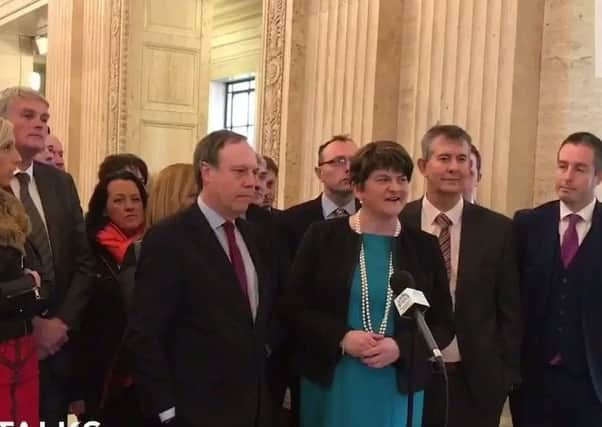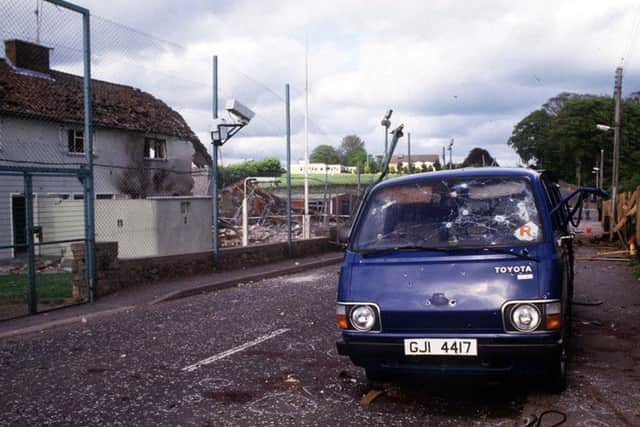Ben Lowry: DUP will need to compromise, but should resist the key IRA goal of separate legacy inquests


One case is a private action against the police and army over the deaths, for allegedly operating a shoot to kill policy in the incident (in which the IRA gang was stopped as it attacked an isolated police station).
This week it emerged that the police have agreed to hand over nearly 40 folders of documents for the action.
Advertisement
Hide AdAdvertisement
Hide AdThe other Loughgall case is a judicial review over the delay in holding a legacy inquest into the killings.


Such inquests are due to be held into around 100 deaths at the hands of state forces during the Troubles.
The emboldened republican approach to cases such as Loughgall gives a sense of the way legacy matters are heading in Northern Ireland.
Few of the 360 or so state killings by the police and army were as justifiable as using lethal force to stop a notorious and highly armed IRA gang at Loughgall.
Advertisement
Hide AdAdvertisement
Hide AdIndeed, there is now in the western world such unanimity about the need to stop ruthless terrorists before they murder that Jeremy Corbyn was contradicted by most of his Labour frontbench when he was asked if it was OK for the security forces to shoot terrorists during an Isis attack and he could not bring himself to say yes.


But republicans are now so confident about the past that they are trying to get courts to rule that the security forces should have arrested killers even in Loughgall situations.
Republicans are of course going to push the notion that all state killings were illegitimate, as it makes sense for them to do. But unionists have unwittingly bought into that narrative.
They are emphasising the statistic that 10% of the Troubles deaths were at the hands of the state and saying that legacy probes should have only a 10% focus on state.
Advertisement
Hide AdAdvertisement
Hide AdThis appears to concede that state deaths were almost all wrong. In fact most were justified and almost none pre-meditated.
Tragically an innocent civilian was killed in the crossfire at Loughgall. The pending inquests into such state killings could find police-army shortcomings and result in files sent to prosecutors even when they have shot dead some of the most fanatical terrorists in recent European history.
It was when relatives of the IRA man Joe McCann killed in 1972 sought a legacy inquest that his file was instead sent to prosecutors, leading to two soldiers being charged.
And in the legacy inquest into the killing of another IRA man, Pearse Jordan, a judge said he was exercising his discretion to report two RUC officers to prosecutors for inconsistent evidence (they were not even the officers who shot Jordan).
Advertisement
Hide AdAdvertisement
Hide AdYet while many files could in theory end up with prosecutors, it is unlikely that police or soldiers will be jailed because the government is seeking ways to prevent that. That would probably mean some amnesty for IRA too.
This might sound a good compromise: legacy inquests into state killings, that republicans have wanted for years, but no security forces face prison.
But it is disastrous for the reputation of a state that, for all its occasional criminal blunders, most of which were in the early Troubles years, reacted overall with huge restraint towards decades of IRA violence.
If any unionist politicians still fail to see problems with the proposed legacy structures, here is a simple summary: the reputation of the state is being hung by the civil law standard of balance of probabilities, such as the Bloody Sunday inquiry or Ombudsman reports into past police failures, with a wide definition of collusion, and perhaps to be followed by five years of legacy inquest mini inquiries.
Advertisement
Hide AdAdvertisement
Hide AdBut in criminal cases (beyond all reasonable doubt standard), police and army are also more vulnerable. Kingsmill showed that even a palm print is hard to link to a historic crime scene when accompanying evidence and context is lost.
Finding an elderly soldier or RUC man is easy.
So even if the UK government ensures that the proposed Historical Investigations Unit (HIU) investigates killings proportionate in number to the groups responsible (ie overwhelmingly terrorist), honest prosecutors will have more evidence on police and army.
At the same time, republicans will use relentless legacy inquests findings to say Britain was murderous and their violence was necessary.
One way to balance this would be legacy processes that can judge the IRA on the balance of probabilities, such as private civil cases against the worst killers or a major public inquiry into the Provisionals.
Advertisement
Hide AdAdvertisement
Hide AdBloody Sunday was such an outrage, and Widgery such a whitewash, that it was right to hold the inquiry but it cost £13 million per death. A similar scale inquiry into the outrage of the IRA would be a cost of around £120,000 per victim.
But neither unionists nor London ever suggested anything such as this.
They look mean now if they say no to SHA structures, but if they had gone in with their own demands a compromise between their terms and the Sinn Fein demands would have been better than the outcome they now face.
Article Two of the European Convention of Human Rights requires the UK to investigate state killings. There is also a moral obligation to recognise the 100+ killings of civilians in a formal process.
Advertisement
Hide AdAdvertisement
Hide AdIn an ideal world there would be some prosecutions of soldiers or police. But in an ideal world jailing terrorist godfathers would be the highest priority of all.
Nothing is putting past state failures into their typically chaotic context.
Prior to the 2014 Stormont House Agreement (SHA) there was, I understand, resistance among the UK government and unionists to having legacy inquests as a separate process but unionist negotiators buckled on that IRA goal. That makes things harder now.
But the DUP must now emphasise the state failure under Article Two to protect the many people in the Troubles who died at the hands of the most dedicated IRA operatives, well known to the authorities but who the state was unable to apprehend because it felt politically unable to introduce tougher anti terror laws.
Advertisement
Hide AdAdvertisement
Hide AdWe now have a prime minister who is wary of the ECHR because of the way it can be used by terrorists, so even if in 2014 there was a failure to grasp the reason why republicans demanded these separate inquests, there is a chance to make a case now straight to Downing Street.
Sinn Fein is acting as if it was the largest party and as if it can now get what it wants.
But in the same way that unionists will not get everything they want in the bartering, neither should republicans.
And if there is one thing to which the DUP must now say no, it is to a separate inquest process without a clear balance-of-probabilities process that will identify the murder and mayhem of the IRA and its leaders.
• Ben Lowry (@BenLowry2) is News Letter deputy editor